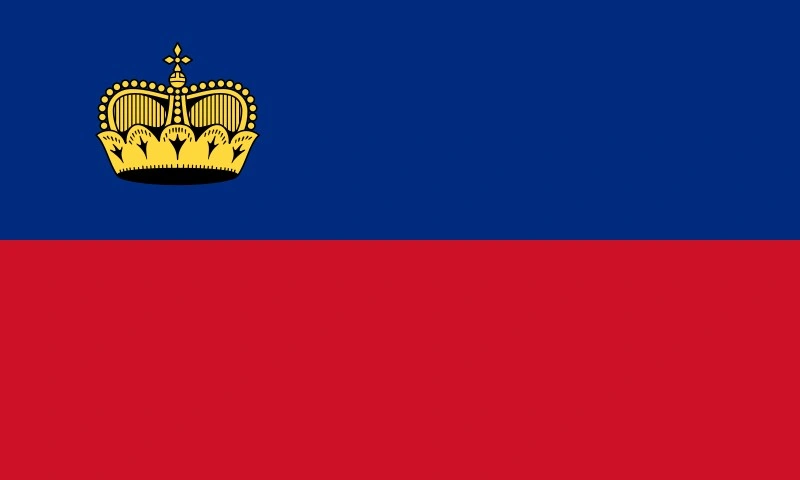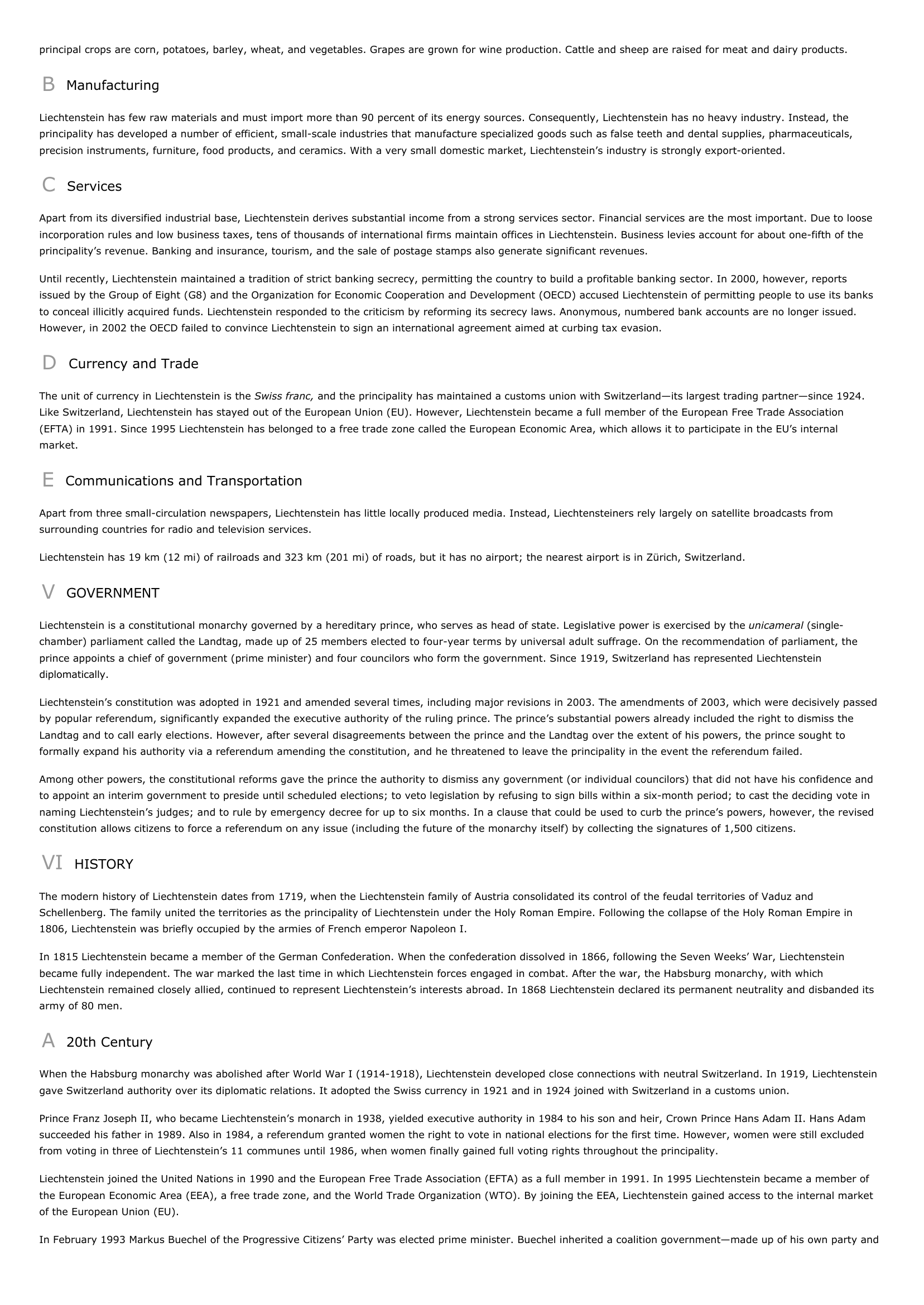Liechtenstein - country.
Publié le 04/05/2013

Extrait du document


«
principal crops are corn, potatoes, barley, wheat, and vegetables.
Grapes are grown for wine production.
Cattle and sheep are raised for meat and dairy products.
B Manufacturing
Liechtenstein has few raw materials and must import more than 90 percent of its energy sources.
Consequently, Liechtenstein has no heavy industry.
Instead, theprincipality has developed a number of efficient, small-scale industries that manufacture specialized goods such as false teeth and dental supplies, pharmaceuticals,precision instruments, furniture, food products, and ceramics.
With a very small domestic market, Liechtenstein’s industry is strongly export-oriented.
C Services
Apart from its diversified industrial base, Liechtenstein derives substantial income from a strong services sector.
Financial services are the most important.
Due to looseincorporation rules and low business taxes, tens of thousands of international firms maintain offices in Liechtenstein.
Business levies account for about one-fifth of theprincipality’s revenue.
Banking and insurance, tourism, and the sale of postage stamps also generate significant revenues.
Until recently, Liechtenstein maintained a tradition of strict banking secrecy, permitting the country to build a profitable banking sector.
In 2000, however, reportsissued by the Group of Eight (G8) and the Organization for Economic Cooperation and Development (OECD) accused Liechtenstein of permitting people to use its banksto conceal illicitly acquired funds.
Liechtenstein responded to the criticism by reforming its secrecy laws.
Anonymous, numbered bank accounts are no longer issued.However, in 2002 the OECD failed to convince Liechtenstein to sign an international agreement aimed at curbing tax evasion.
D Currency and Trade
The unit of currency in Liechtenstein is the Swiss franc, and the principality has maintained a customs union with Switzerland—its largest trading partner—since 1924. Like Switzerland, Liechtenstein has stayed out of the European Union (EU).
However, Liechtenstein became a full member of the European Free Trade Association(EFTA) in 1991.
Since 1995 Liechtenstein has belonged to a free trade zone called the European Economic Area, which allows it to participate in the EU’s internalmarket.
E Communications and Transportation
Apart from three small-circulation newspapers, Liechtenstein has little locally produced media.
Instead, Liechtensteiners rely largely on satellite broadcasts fromsurrounding countries for radio and television services.
Liechtenstein has 19 km (12 mi) of railroads and 323 km (201 mi) of roads, but it has no airport; the nearest airport is in Zürich, Switzerland.
V GOVERNMENT
Liechtenstein is a constitutional monarchy governed by a hereditary prince, who serves as head of state.
Legislative power is exercised by the unicameral (single- chamber) parliament called the Landtag, made up of 25 members elected to four-year terms by universal adult suffrage.
On the recommendation of parliament, theprince appoints a chief of government (prime minister) and four councilors who form the government.
Since 1919, Switzerland has represented Liechtensteindiplomatically.
Liechtenstein’s constitution was adopted in 1921 and amended several times, including major revisions in 2003.
The amendments of 2003, which were decisively passedby popular referendum, significantly expanded the executive authority of the ruling prince.
The prince’s substantial powers already included the right to dismiss theLandtag and to call early elections.
However, after several disagreements between the prince and the Landtag over the extent of his powers, the prince sought toformally expand his authority via a referendum amending the constitution, and he threatened to leave the principality in the event the referendum failed.
Among other powers, the constitutional reforms gave the prince the authority to dismiss any government (or individual councilors) that did not have his confidence andto appoint an interim government to preside until scheduled elections; to veto legislation by refusing to sign bills within a six-month period; to cast the deciding vote innaming Liechtenstein’s judges; and to rule by emergency decree for up to six months.
In a clause that could be used to curb the prince’s powers, however, the revisedconstitution allows citizens to force a referendum on any issue (including the future of the monarchy itself) by collecting the signatures of 1,500 citizens.
VI HISTORY
The modern history of Liechtenstein dates from 1719, when the Liechtenstein family of Austria consolidated its control of the feudal territories of Vaduz andSchellenberg.
The family united the territories as the principality of Liechtenstein under the Holy Roman Empire.
Following the collapse of the Holy Roman Empire in1806, Liechtenstein was briefly occupied by the armies of French emperor Napoleon I.
In 1815 Liechtenstein became a member of the German Confederation.
When the confederation dissolved in 1866, following the Seven Weeks’ War, Liechtensteinbecame fully independent.
The war marked the last time in which Liechtenstein forces engaged in combat.
After the war, the Habsburg monarchy, with whichLiechtenstein remained closely allied, continued to represent Liechtenstein’s interests abroad.
In 1868 Liechtenstein declared its permanent neutrality and disbanded itsarmy of 80 men.
A 20th Century
When the Habsburg monarchy was abolished after World War I (1914-1918), Liechtenstein developed close connections with neutral Switzerland.
In 1919, Liechtensteingave Switzerland authority over its diplomatic relations.
It adopted the Swiss currency in 1921 and in 1924 joined with Switzerland in a customs union.
Prince Franz Joseph II, who became Liechtenstein’s monarch in 1938, yielded executive authority in 1984 to his son and heir, Crown Prince Hans Adam II.
Hans Adamsucceeded his father in 1989.
Also in 1984, a referendum granted women the right to vote in national elections for the first time.
However, women were still excludedfrom voting in three of Liechtenstein’s 11 communes until 1986, when women finally gained full voting rights throughout the principality.
Liechtenstein joined the United Nations in 1990 and the European Free Trade Association (EFTA) as a full member in 1991.
In 1995 Liechtenstein became a member ofthe European Economic Area (EEA), a free trade zone, and the World Trade Organization (WTO).
By joining the EEA, Liechtenstein gained access to the internal marketof the European Union (EU).
In February 1993 Markus Buechel of the Progressive Citizens’ Party was elected prime minister.
Buechel inherited a coalition government—made up of his own party and.
»
↓↓↓ APERÇU DU DOCUMENT ↓↓↓
Liens utiles
- Islande Reykjavik Finlande Finlande Suède Suède Norvège Fédération de Russie Helsinki Stockholm Oslo Tallinn Estonie Moscou Riga Lettonie Lituanie Danemark Vilnius Copenhague Dublin Irlande Russie Biélorussie Royaume-Uni Londres Minsk Amsterdam Pays-Bas Kiev Varsovie Berlin Allemagne Pologne Ukraine Bruxelles Belgique Paris G-D Luxembourg Luxembourg Prague Rép. Tchèque Slovaquie France Liechtenstein Suisse Vaduz Berne Saint-Marin Saint-Marin Monaco M
- LA MUSIQUE COUNTRY
- Country- und Western-Musik - Musik.
- Pays noir, en anglais Black Country, terme imagé désignant les régions industrielles fondées sur l'extraction du charbon depuis l'époque de la révolution industrielle.
- Nelson Mandela's Inaugural Address Nobel Peace Prize winner and former political prisoner, Nelson Mandela, was elected president of the Republic of South Africa in April 1994 in the country's first multiracial elections.


